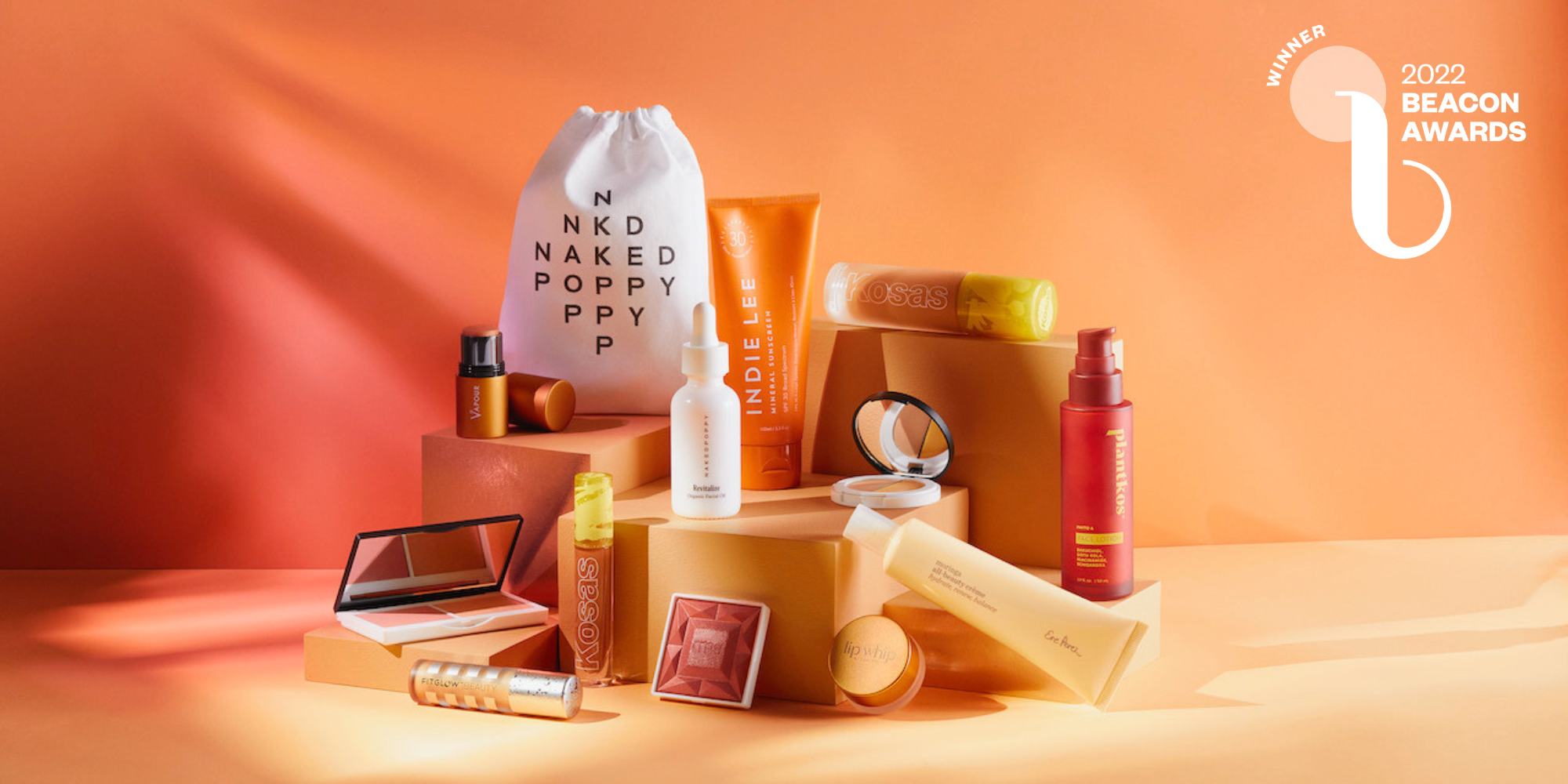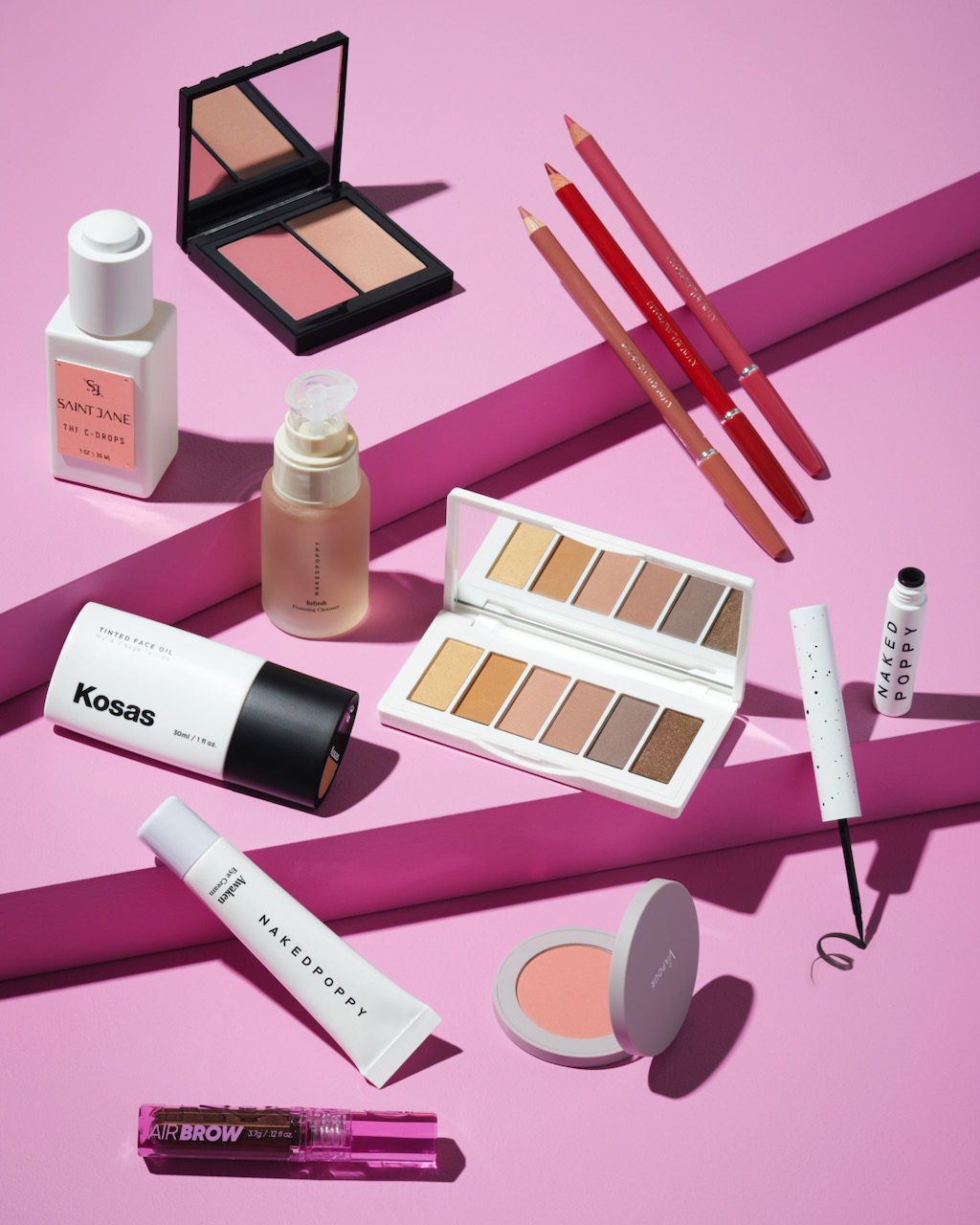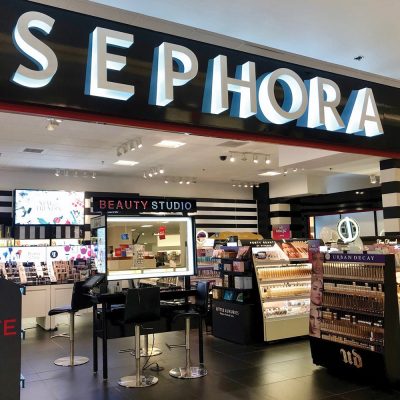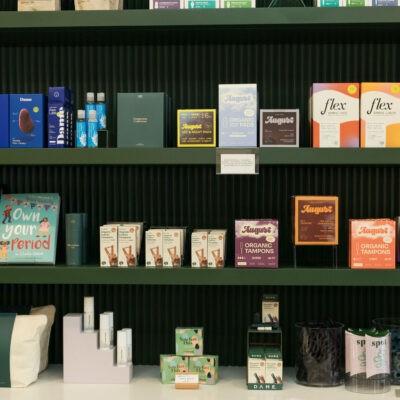
AI-Driven Personalization Fuels Clean Beauty E-tailer NakedPoppy’s Growth
NakedPoppy co-founder and CEO Jaleh Bisharat believes artificial intelligence-driven personalization is the future of retail—and her clean beauty e-tailer is already there.
“Someday we’re going to look back and say, ‘How did I ever shop any other way?” she says. “Why did I walk into a major retailer and think this was OK when I could have given them a little bit of information about myself and have them say, ‘Go to aisle X and the best products for you are in bin two’?”
NakedPoppy, a 2022 Beacon Award winner, utilizes an algorithm that instantly ranks the 750 makeup and skincare products it stocks based on the results of a three-minute customer assessment. It takes into account skin type, skin color, undertone, age, hair color, eye color, skin allergies and sensitivities, and provides customers with their own tailored boutiques.
Thirty-three brands are available on NakedPoppy, including Mara, Saint Jane, Tata Harper, Kjaer Weis, Fitglow, Au Naturale and Rituel de Fille. The platform has branded makeup and skincare products, too. Alima Pure, Antonym, Clove + Hallow, Ere Perez, Kari Gran, Kosas, Lily Lolo, Spela, Suntegrity and Vapour were the first ten brands available at the time of the platform’s launch.
Products that most closely match a customer’s unique attributes are listed as a “Perfect Match,” and next-best alternatives are listed as “Great Matches.” Tools such as makeup brushes, gua shas and eyelash curlers are also available on the platform, but don’t factor into the product-matching process.
Bisharat stresses that NakedPoppy’s personalized results eliminate the hassle of online beauty shopping for time-starved customers looking for quick recommendations. Brands aren’t charged marketing fees on the platform to appear in product recommendations.
“We’ve mapped all the ingredients to all the products on the site,” says Bisharat. “So, if the customer flags an allergy or a sensitivity, we can flag all those products, and she’s not wasting her time reading labels.”
Launched in 2019 with $4 million in venture capital funding from Cowboy Ventures, Felicis Ventures and Khosla Ventures, among other investors, NakedPoppy’s business didn’t begin gaining momentum until two years later as it worked to fine-tune backend technology. It achieved triple-digit growth between 2021 and 2022 and secured a patent for its algorithm.
Per Bisharat, hundreds of thousands of people have taken the platform’s customer assessment. Co-founder Kimberly Shenk left the company in late 2019 to launch Novi Connect, a platform that connects indie brands with eco-conscious ingredient and manufacturing suppliers.

A former marketing executive at Amazon, Eventbrite and Upwork, Bisharat started NakedPoppy after a breast cancer diagnosis caused her to reassess her beauty and personal care routine. An in-house cosmetic chemist vets every ingredient in every product before it can be listed on NakedPoppy. Out of 12,500 ingredients that can be used in beauty and personal care products, 1,268 are allowed on the platform. The products on NakedPoppy have to be cruelty-free, and they’re evaluated for environmental and community impacts by a panel of scientists, chemists and product formulators.
Although clean beauty is under scrutiny, Bisharat has discovered that NakedPoppy’s customers remain undeterred and place a high value on the e-tailer’s strict vetting process. “Clean is a very important part of why our customers come to us,” she says. “They feel they can trust us, and we’ve been committed to clean beauty since day one. NakedPoppy is as much a health company as a beauty company.”
Customers may be coming to NakedPoppy for its clean standards, but Bisharat notes they’re staying for the accuracy of its color-matching, which is powered by data scientists and insights from makeup artists. She says, “We’ve done extensive studies into color science, and we get it right a lot, like 80% to 90% of the time.”
Makeup accounts for two-thirds of NakedPoppy’s sales. Foundation, concealer and lipstick are particularly popular products. Skincare sales constitute the remaining one-third of the business. Kosas, Ere Perez, Lily Lolo and NakedPoppy are top-selling brands. Its best customers tend to buy at least six times a year, and the average order value lands in the low triple-digits.
Bisharat says the platform’s customer retention is double the standard customer retention in the beauty industry. Data analytics firm Metrilo estimates that beauty websites generally retain nearly a fourth of all customers, meaning their retention rate is 23% or 1.6 orders per customer on average. Bisharat says, “It is much more sticky on our platform because the customer has invested the time to tell us about themselves, and our AI system learns from customer behavior and from itself.”
For example, returns are recorded in a customer’s profile to keep the platform’s algorithm updated on preferences. NakedPoppy’s personalization algorithm helps to keep returns less than a quarter below the average rate of online return. The National Retail Federation figured that average rate of online return was 16.5% in 2022.

NakedPoppy relies on organic marketing tactics to attract new customers. While the e-tailer is seeing rising interest on TikTok and Pinterest, its refer-a-friend program is its biggest top-of-funnel strategy. Similar to many referral programs, customers earn redeemable points for friends they refer to the platform.
“If you’re solving a real problem, people are going to tell each other. So, we’ve always emphasized organic marketing,” says Bisharat. “It’s better for companies financially, but it forces them to deliver a product and a customer experience that people love enough to tell each other about.”
Corporate events are customer acquisition tools for NakedPoppy, too. This month, the e-tailer has five virtual self-care events on its calendar with companies such as Coinbase and Dropbox. Typically, an event is spearheaded by a NakedPoppy skincare specialist, and each attendee is sent a curated box of products from the website.
Body care and haircare are expected to be the next categories to debut on NakedPoppy, but Bisharat isn’t rushing into them. “We have a lot more that we can do in color right now, and we have to be consistent with what we offer customers,” she says. “We’d have to build a whole separate algorithm for any additional verticals.”
Bisharat is hoping NakedPoppy will expand into physical retail in the future, whether it’s through a strategic partnership with an existing retailer or a standalone store. She theorizes the platform’s technology could ease a critical retail pain point: staff turnover.
“Retail in general is having the worst time finding, training and retaining salespeople. Anything technology can do to address that is key,” says Bisharat. “If you’ve got backend technology that’s knowledgeable about all your products, it could be very useful to someone who’s only been on the sales floor for two days, for example. That wasn’t true even five years ago.”
This story was updated with new information on Thursday, March 9.





Leave a Reply
You must be logged in to post a comment.